Herbal healers IV
Herbal healers IV
Eranda
Scientific name : Ricinus communis,
Family : Euphorbiaceae
Vernacular name
- Assamese : Eda, Era
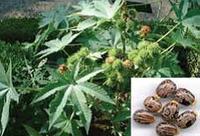
- Bengali : Bherenda
- English : Castor oil plant
- Gujrati : Erandio, Erando
- Hindi : Arand, Erand, Andi, Rend
- Kannada : Haralu, Oudala gida
- Kashmiri : Aran, Banangir
- Malayalam : Avanakku
- Marathi : Erand
- Oriya : Jada, Gaba
- Punjabi : Arind
- Tamil : Amanakku
- Telugu : Amudapu veru
- Urdu : Bedanjir, Arand
Medicinal Uses
- Jaundice: Fine paste of 5gms Tender leaves of eranda is administered orally early in the morning in empty stomach , helps to cure jaundice.
- Joint Pains: Mature leaves paste mixed with little crystal salt and warmed. This luke warm paste is applied over the muscular swelling and joint pains. This pacifies the swelling and reduces the pain.
- Scrotal Enlargement: 10ml of castor oil mixed with one cup of milk should be taken daily once during night time after food for a month.
- Sciatica: 10 grams of eranda root powder boiled in 100ml of milk and reduced to half is administered orally twice daily to relieve the pain in sciatica. It also cures constipation.
- Colic: Whole leaf of castor is smeared with sesame oil and warmed slightly. This is applied over the abdomen (Umbilicus) to pacify abdomen colic.
- Worm infestation: 2 gms of Palasha seeds powder is taken along with 10 ml of castor oil as bed tome. The pin worms are relieved within 3-4 days by this medication.
- Lactation: The leaves are heated and applied over the breast as a bandage to induce milk secretion in lactating mothers. It is also beneficial in breast abscess.
Erandakarkati
Scientific name :Carica papaya
Family : Caricaceae
Vernacular name
- Bengali : Papeyaa, Pappiyaa
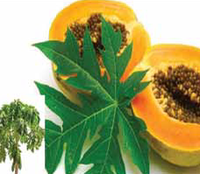
- English : Papaya, Melon tree, Pawpaw
- Gujarati : Erandakaakadi, Papaiyu, Papita
- Hindi : Papitaa
- Kannada : Pirangi, Pappaay
- Malayalam : Karmaasu, Pappaay, Karumatti
- Marati : Papaayaa, Papai
- Punjabi : Erandakharbujaa
- Tamil : Pappali
- Telugu : Boppayi, Bobbaasi, Paringi
Medicinal Uses
- Worm infestation: Administration of 30ml of raw fruit juice of Erandakarkati (papaya) with honey once a day for 1 week is beneficial to expel intestinal worms. Regular intake of boiled fruit expels the worms especially Pin worm.
- Menstrual irregularities: Regular intake of raw papaya also acts as a uterine tonic and cures ailments pertaining to reproductive organs. However consumption of the fruit should be avoided during pregnancy as some times it may lead to abortion.
- Face pigmentation: The paste prepared from ripened papaya fruit pulp with fresh milk is an excellent face pack. It moisturizes the skin and removes the hyper pigmentation of the face.
- Dengue fever: Papaya leaves juice administered in the dose of 10 to 20 ml, 3 to 4 times a day, helps in restoring the normal platelet count and decreases fever in Dengue.
- Eye disease: Papaya fruit rich in Vitamin A and Carotene so regular intake of fruit prevents eye disease, age related macular degenerative diseases and promotes vision.
- Dysentry: 3gms of papaya seed powder with warm water twice daily before food is beneficial as it has antibacterial properties.
Gokshura
Scientific name : Tribulus terrestris
Family : Zygophyllaceae
Vernacular name
- Assamese : Gokshura, Gukhurkata
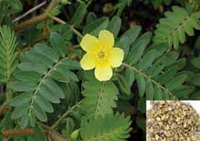
- Bengali : Gokshura, Gokhri
- English : Caltrops root
- Gujrati : Be tha gokharu, Nana gokharu, Mithogokharu
- Hindi : Gokhru
- Kannada : Sannanaggilu, Neggilamullu, Neggilu
- Kashmiri : Michirkand, Pakhda
- Malayalam : Nerinjil
- Marathi : Sarate, Gokharu
- Oriya : Gukhura, Gokhyura
- Punjabi : Bhakhra, Gokhru
- Tamil : Nerinjil, Nerunjil
- Telugu : Palleruveru
- Urdu : Khar-e-Khasak Khurd
Medicinal Uses
- Male infertility: The mixer of 5gms of Gokshura powder and 5gms of Ashwagandha powder is boiled in 100 ml of milk till it reduced to 50ml. Administration of this decoction twice a day for ten days stimulates secretion of Testosterone and promotes spermatogenesis.
- Urinary calculi: : (i) 10gms of gokshura fruit coarse powder boiled in 100 ml of water till it reduced to 25ml and drink twice a day. (ii) Equal quantity of gokshura, sonth (dry ginger), methi (fenugreek seeds) and ashwagandha powders are mixed well. 5gms of this powder taken twice daily with coconut water decreases Uric acid and gives relief in swelling.
- Painful urination: 5gms of gokshura fruit powder and 3gms of coriander seeds are boiled in 100ml of water till it reduced to 25ml. Administration of this decoction twice a day for few days is beneficial in painful micturition.
- Jaundice: 5gms of whole gokshura plant powder, 2gms of cinnamom, 6 cardamom and 2tsp of misri powders are taken internally along with luke warm water three times a day is useful in jaundice.
- Alopecia: Equal quantity of gokshura and sesame flowers are made into paste by adding honey. Apply this paste on the bald areas to stimulate re growth of hair and nourish the scalp.
Guduchi
Scientific name : Tinospora cordifolia,
Family : Menispermaceae
Vernacular name
- Assamese : Siddhilata, Amarlata
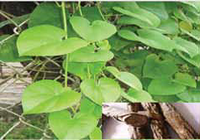
- Bengali : Gulancha
- English : Indian Tinospora, Heartleaved moonseed
- Gujrati : Galac, Garo
- Hindi : Giloe, Gurcha
- Kannada : Amrutaballi
- Kashmiri : Amrita, Gilo
- Malayalam : Chittamrutu
- Marathi : Gulvel
- Oriya : Guluchi
- Punjabi : Gilo
- Tamil : Seendal, Seendil kodi
- Telugu : Thippateega
- Urdu : Gilo
Medicinal Uses
- Diabetes: The whole plant is crushed and juice is extracted. 10 ml juice is given 3 times daily before food is a very effective remedy to control the glucose level.
- Jaundice: Adminstration of 10 gms of paste of guduchi leaves with butter milk twice daily for one week, relieve the jaundice
- Fever: 5gms of Guduchi stems boiled in 100ml of water till it reduced to 1/4th. Intake of this decoction twice a day is an effective remedy for fever. For better results parpataka (Fumaria officinalis), chandana, dry ginger, mustha (Cyperus rotundus )can be used for preparation of this decoction
- Gastritis: 5gms of guduchi stem, fistful of nimba leaves, fistful of patola leaves cooked in 100ml of water and reduced it into 1/4th. Internal administration of this decoction along with honey twice daily is useful in gastritis.
- As Rasayana: 20ml of Guduchi juice is recommended daily in the case of AIDS. Research work on this plant has proved that it increases the immunity and defense mechanism against the retro virus and increases the lifespan of the patient.
- Arthritis: 20 ml of Guduchi juice is advised twice daily in Rheumatoid arthritis.
Gunja
Scientific name : Abrus precatorius
Family : Fabaceae
Vernacular name
- Assamese : Rati
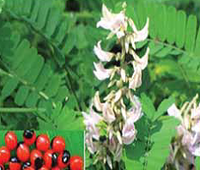
- Bengali : Kunch, Shonkainch
- English : Jequirity
- Gujrati : Rati, Chanothee
- Hindi : Ratti, Ghungchi
- Kannada : Galuganji, Gulagunjee
- Kashmiri : Kath
- Malayalam : Kunni, Cuvanna Kunni
- Marathi : Gunja
- Oriya : Kainch
- Punjabi : Ratti
- Tamil : Kuntri, Kunrimani, Kundamani
- Telugu : Guriginja, Gurivinda
- Urdu : Ghongcha, Ratti
Medicinal Uses
- Dandruff: External application of the paste of the root, seed and leaves of Gunja over the scalp . Wash the hair with mild shampoo after ½ hour. Regular application once in a week is beneficial in destroy the dandruff.
- Leucorrhoea: Intake of 5 gm gunja root powder with rice water after food twice daily is beneficial in leucorrhoea.
- Hair growth: Oil cooked with coarse powder of gunja seeds along with bhringaraja(Eclipta alba), external application over scalp in good for hair growth.
- Joint pains: Equal quantity of Nirgundi leaves, Eranda leaves, Gunja seeds luke warm paste poultice applied externally to relieve joint pains, swelling, sciatica pain and cervical spondylosis etc
- Leucoderma (Switra): The mixture of equal quantity of Gunja seeds, paste Chitrak (plumbago) root paste is applied over the white patches and exposure to the sunlight 10-15min during early morning is beneficial.
- Erysipelas (Visarpa): Regular application of Fine paste of the gunja leaves over the affected part relieves the burning sensation.
Haridra
Scientific name : Curcuma longa
Family : Zingiberaceae
Vernacular name
- Assamese : Haldhi, Haladhi
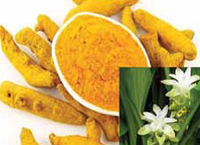
- Bengali : Halud, Haldi
- English : Turmeric
- Gujrati : Haldar
- Hindi : Haldi, Hardi
- Kannada : Arishina
- Kashmiri : Ledar, Ladhir
- Malayalam : Manjal
- Marathi : Halad
- Oriya : Haladi
- Punjabi : Haldi, Haldar
- Tamil : Manjal
- Telugu : Pasupu
- Urdu : Haldi
Medicinal Uses
- Cancer prevention: Every day morning, take 10 gms of turmeric powder mix in a cup of warm water for 40 days. This prevents cancer as turmeric has strong cytotoxic effects against certain forms of cancer.
- Halitosis: Burn turmeric rhyzome and make it into fine powder and use this powder with salt as a tooth powder. This will maintain the gums and teeth in a healthy condition and prevent halitosis.
- Burns : Mix 1 tsp of turmeric with 1 tsp of aloevera gel and apply this paste over burnt area.
- Dental problems : Mix 1 teaspoonful of turmeric, ½ teaspoonful of salt and sufficient mustard oil to make a paste. Rub the teeth and gums with this paste twice daily.
- Sore throat: Take 1 cup milk, 3gms of turmeric powder and 3gms of black pepper powder,heat on medium flame for 4 to 5 minutes. Drink this Golden milk daily at bed time.
- Jaundice: Mix 1 teaspoonful of turmeric powder with 1 glass of warm water 3 times a day for 2 weeks or until you see the positive results.
- Filariasis: Take 3gms turmeric powder and 3gms jaggery with half cup of Cowʼs urine twice daily internally . It destroys Filarial worms.
- Conjunctivitis: Eyes are washed with turmeric water(5 gms boiled in 100ml water) and bandaging the eyes with white cloth soaked in turmeric water during night times while sleeping.
Haritaki
Scientific name : Terminalia chebula
Family : Combretaceae
Vernacular name
- Assamese : Shilikha
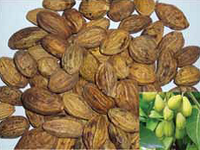
- Bengali : Haritaki
- English : Myrobalan
- Gujrati : Hirdo, Himaja, Pulo-harda
- Hindi : Harre, Harad, Harar
- Kannada : Alalekai
- Kashmiri : Halela
- Malayalam : Katukka
- Marathi : Hirda, Haritaki, Harda, Hireda
- Oriya : Harida
- Punjabi : Halela, Harar
- Tamil : Kadukkai
- Telugu : Karaka, Karakkaya
- Urdu : Halela
Medicinal Uses
- Piles: A sitz bath with 10gms of Haritaki or Triphala powder, in half a bucket of hot water, for 10 minutes, before bath, is useful in reducing the swelling and pain in piles.
- Acne: Local application of haritaki paste on acne will not only cure acne but also prevents scarring.
- Cough: Administration of haritaki powder 2 gms with honey two to three times a day internally alleavates cough.
- Gastritis: Internal administration of 5gms of haritaki powder mixed in hot water and regularly, increases mucus production in the stomach forming a protective barrier, preventing heartburn and ulcer.
- Dandruff: Take a cup of coconut oil in a pan and add 3 haritaki pods and heat it. Once it turns brown, with outer shell cracks turn off the flame, let it be cool and store in a glass bottle. Apply this oil regularly to prevent from dandruff and lice.
- Obesity: Intake of 5gms of haritaki powder with warm water in the early morning on empty stomach can regulate hunger when combined with proper diet and exercise help to reduce weight naturally.
Harita manjari
Scientific name : Acalypha indica
Family : Euphorbiaceae
Vernacular name
- Assamese : Patrasaki, Mukuta manjar
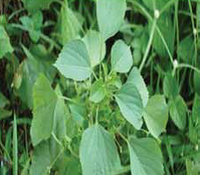 i
i - Bengali : Muktajhuri
- English : Indian Acalypha
- Gujarati : Vanchi Kanto
- Hinndi : Kuppi, Aamaabhaaji
- Kannada : Kuppigida
- Malayalam : Kuppameni
- Marati : Khokli, Khajoti
- Oriya : Indramaris, Nakachana
- Punjabi : Kuppi
- Tamil : Kupaaimeni
- Telugu : Kuppichettu, Kuppinta, Muripindi
Medicinal Uses
- Worm infestation: Internal administration of the harita manjari leaves juice 10 ml for children and 15-30ml in case of adults early in the morning for 15days is useful to expel the intestinal worms.
- Scabies: The paste of harita manjari leaves with salt and applied externally is beneficial to cure scabies.
- Wound: The paste of harita manjari leaves and turmeric is applied externally useful in case of ulcers and insects bites.
- Arthritis: Harita manjari leaves are mildly fried in gingerly oil and is applied externally to get the relief from painful arthritis.
- Bedsores: The dried leaf powder of harita manjari dusted and bandaged over the bed-sore areas for healing.
- Food poisoning: Equal quantity of harita manjari leaves juice and neem oil is applied over uvula of children. This will induce emesis and eliminate mucus from intestine.
- Stomach infection: Intake of the paste prepared from harita manjari leaves and garlic in a dose of 3gms along with the first bolus of food alleiavates stomach infection.
Hingu
Scientific name : Ferula foetida
Family : Apiaceae
Vernacular name
- Assamese : Hing
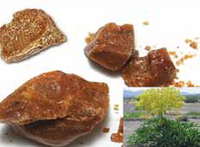
- Bengali : Hing
- English : Asfoetida
- Gujrati : Hing, Vagharni
- Hindi : Hing, Hingda
- Kannada : Hing, Ingu
- Kashmiri : Eng
- Malayalam : Kayam
- Marathi : Hing, Hira, Hing
- Oriya : Hengu, Hingu
- Punjabi : Hing
- Tamil : Perungayam
- Telugu : Inguva
- Urdu : Hitleet, Hing
Medicinal Uses
- Dysmennohea: Intake of 100ml of buttermilk with a pinch of Asafoetida(Hing), 1/2 teaspoon of Fenugreek(Methi) powder and little salt twice daily for 3 days is beneficial.
- Toothache: Mix ½ teaspoon of Asafoetida(Heeng) powder in 2 teaspoons of lime juice and heat the solution slightly. Dip a small cotton ball in the solution and place it on the aching place for 20-30 minutes to get relief.
- Headache: Prepare the paste of 1 part of hingu, 1 part of dry ginger, 1 part of camphor, 2 parts of tailed pepper by adding some milk. External application of this fine paste on the forehead to cure tension headaches as well as migraine.
- Flatulence: Mix 1gm of dry ginger powder, a pinch of Hing, little black salt added in 100ml of warm water or butter mik and consume twice daily.
- Indigestion: Take 5gms of powder prepared from equal quantity of dried ginger, long pepper, curry leaves, ajwain, black pepper, Cumin and Asafoetida(Heeng) with a little ghee and salt and taken with the first bolus of food is useful in indigestion and flatulance etc.
- Piles: Regular intake of 100 ml of buttermilk with a pinch of hing twice or thrice a day is highly beneficial in piles.
Indravalli
Scientific name : Cardiospermum halicacabum
Family : Sapindaceae
Vernacular name
- Bengali : Jyotishmati
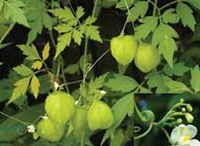
- English : Ballon Vine, Heartʼs Pea
- Gujrati : Bodha, Kapaalphodi, Shivajaala, Nayaphataki
- Hindi : Kaanphuti, Lataaphataki
- Kannada : Kanakayya
- Malayalam : Ulinna
- Marathi : Fatphati
- Tamil : Modikkottan, Mudakkarutana(Siddha), Mudukkottan
- Telugu : Vekkudutiga
Medicinal Uses
- Arthritis: The tila oil cooked with the leaves of indravalli acts as a very effective on external application for arthritis .
- Ear ache: 2 to 3 drops of juice of the indravalli leaves can be used as a ear drops for ear ache, purulent discharge from ears.
- Piles: The decoction prepared from the roots or Whole plant of indravalli (20gms of paste is boiled in 200ml of water and till it reduced to 50ml) twice daily can be given for piles.
- Postpartum care: Indravalli leaves paste applied and tied over the lower abdomen of the delivered woman for one week after delivery. This helps in expulsion of waste products out of the uterus.
- Dandruff: The leaves are soaked in hot water for 3-4 hours and then crushed well. This water is used in cleaning the hairs. The oil prepared from the paste of the leaves and gingerly oil can be used as a hair tonic and cure for dandruff.
- Cold & Cough: Soup prepared with fistful of indravalli (ballon vine) leaves, pepper, cumin seeds, salt (as per taste) cooked in 100ml of water for 5-10 min. This soup is perfect for cold and cough in children.
Source: Ayurveda offering Herbal healing
Last Modified : 3/2/2020
